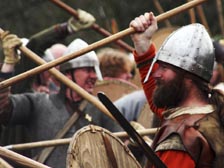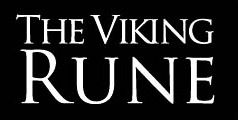 Professor Mark Jobling of Leicester University, who now seems to be the ultimate authority on Viking bloodlines in northern England within the national project to create a genetic map of the UK, has launched a new exciting study. Men whose fathers’ fathers were born in Cumbria, Lancashire, Cheshire, North Yorkshire, Durham or Northumberland are wanted to take part in it.
Professor Mark Jobling of Leicester University, who now seems to be the ultimate authority on Viking bloodlines in northern England within the national project to create a genetic map of the UK, has launched a new exciting study. Men whose fathers’ fathers were born in Cumbria, Lancashire, Cheshire, North Yorkshire, Durham or Northumberland are wanted to take part in it.
Special attention is paid to people with such local surnames as Borrowdale, Branthwaite, Haygarth, Oldcorn, Satterthwaite and Thornthwaite. However, all eligible volunteers will be sent DNA sample kits in order to determine if they have Viking heritage. Professor Jobling formulated the aim of the study as follows: “What we want to end up with is a map of the north of Britain showing where the Vikings were concentrated and distinguishing between the Norse Vikings who landed in the west and the Danish Vikings to the east.” The research associate Dr Turi King comments: “The East Midlands is a particularly important area as it formed the heartlands of the Anglo-Saxon kingdom of Mercia and large parts also fell within the area of the Danelaw, an area dominated Danish Vikings during the 9th and 10th centuries.”
How Vikings affected this area is evident in such placenames as Flimby, Birkby, Crosby, Allerby and Dovenby, but the effect on genetics thus far has been less clear. The initiative is part of The People of the British Isles project headed by Professor Sir Walter Bodmer at the University of Oxford. The recently launched research on Viking DNA in Northern England is funded by the Wellcome Trust and forms part of the grant “What’s in a name? Applying patrilineal surnames to forensics, population history, and genetic epidemiology.” It will help to discover the genetic impact of the Angles, Saxons and Vikings on present day Britain.
It is important that some of such genetic variation contributes to inherited differences in susceptibility to cancer and heart disease. The study will continue until late 2010, after which the results will be published.
Photo courtesy jriro2000. Used under the Creative Commons Attribution 2.0 Generic Licence.

Hi!
I am a norwegian. Me and my wife have relations back to the viking ages,
She is a desendent of the viking family Sult, and I from Borg.
My question is: do you have any knowlegde about these families batteling/setteling
In England?
Rachel Wilson
http://www.one-name.org/profiles/thubron.html
Hi,
My family name is Thubron and we originate from County Durham and Northumberland. I believe that we have a Biking heritage. I wonder if you can shed any light on where my family originate from? We are all blonde, blue eyed and tall!!
Thank you,
Rachel
Wow your website sure knows it’s stuff. I have one small question was Reynolds a Viking last name or name.
Yes it is but I think that Viking used old Norse so any last name is a corruption of the original. My last name is bicknell my ancestors took the name after they invaded england with William the Conqueror. Names changed a lot before The Norman settled England. People in Britain did not even have a surname before the Normans came.
Letters don’t stay the same with V and W. They have been changed and mixed up like saying wine like vine. So your ancestral name could be just the spelled the way it was sounded or the way it is written in other languages.
Bykenhulle with the By it means lives by ken means know for and hulle is scream or howl. But at the same time Hull ment hill or high place.
The name is also spelled
Bykenell witch means by know power and strength.
The name switched out the y with a i as it was the style because language is always changing and it goes out of style. Or the Place name of the surname you are given changes.
Biconel is a french form of bicknell
Bicknell or Becknell is what the name ended up being.
Beck means stream and bick was for beacon a high point to defend and alarm people of invaders.
Defending name for Viking were popular think about it if you ransack a village you want to have protection at your homestead so you don’t get ransacked
Arknell was a viking of northern Ireland and when Saint Patrick came to convert the mix of Celtic and norse pagans of northern Ireland they got angy and knocked out one of Saint Patricks followers. So Saint Patrick left and went north of wicknell or wicklow and converted the locals there.
The only person in history was a man Becknell that make the Santa Fe Trail
So do you have confirmation that there is a Becknell of Viking or old norse heritage?
Hello Brother Tom,
Yes of course I do I have read all the books on my last name. Bicknell are a Teutonic race.
Writer Thomas Williams Bicknell states this in his 1903 book.
Beck in swedish is Bäck a small stream.. so there can be as u say nordic blood in u , and btw the normands that invade England 1066 was Viking heritage from Rollo the great viking how was given Normadie .. To protect France from viking attacks
Has this study officially finished as I would love to be able to get hold of one of the DNA kits as my husbands family have always been told they are of Viking descent, but from where I could not say, the family name is Bakes, so does not fit with any of the above apart from the family coming from North Yorkshire as far back as we can find. Please advise where I can find out more and how I can go about getting a DNA test done.
Thanks
Jo
I live at Crosby Ravensworth, about 12 miles S of Penrith, Cumbria UK.
Some years ago the BBC took some DNA samples, but we never had any individual ‘results, only that there was a lot of Viking blood around Penrith!!!
Now, I am giving a talk to the Lakeland Dialect Society, of which I am President about ‘VIKING’ works in our Cumbrian dialect. I realise that the ‘DANES’, who came across the North Sea and moved over here from Yorkshire, spoke a very similar language to the ‘Norwegian’ Vikings, who came round by Orkney and some of whom sojourned in Ireland, before coming into Cumbria from the West.
Do you know of any specific means of differentiating between the two?
Has your DNA study shown up anything on this question?
We are told that ‘by’ as a place name element is ‘Danish’ – yet in Norway ‘byen’ means the town !!!!
I look forward to your response! TED
Not familier with your dialect since i am Danish but i do know that Danish and swedish are ´almost´ the same…
and in the Viking time i belive that the language was germanian.
But in norway they had another language than germanian in that time period.
and for a bit off topic/in topic
My last name are Knudsen.
Tryed to trace my bloodline over the internet, some months ago.
My last name are only shown in America trough some old ´leak´documents, but knudsen are a common last name in Denmark and are widely spread.
i can thou say i have a genetic error, (ADD) so i dont know if i´m Pure viking blood… but if im a decendant from inbreed or cross breed i sadly dont know.
-Apologies for my lack of english, but i hope that you can use my respond to anything usefull in your TED.
//Klaus J. Knudsen
Hi my name is andrea and I’m from Houston Texas and my great grandmother’s maiden name was Knudsen. My great grand father’s last name was Grimland. They were both full blooded Norweign. The Knudsen side sailed from Norway many years ago and settled in Cranfield Gap, Tx.
My ancestors came from around Warwickshire and came to America in 1631 to Weymouth Mass. I am of R1 and L2 stock the same with most early Americans. All I can say is if you make your Y-DNA you will learn you Bloodline. My family crossed the Rhine before Christ I am of Teutonic stock. Dependents of Scandinavia The earliest last name was Pavely A Franco/Norse name for Paul. So my blood line at least on this line was Romanized Paul being a Greco/Roman name. It is known that VisyGoths a Scandinavian Tribe worked as mercenaries for the Romans Taking Roman Names. Aluric sacked Rome and it fell so Viking or Norseman was really a scary name before the Viking we with of attacking the British Isles. The Norse settled lands in Russia, Italy, France, Ireland, Britain, Spain and Eastern Europe ect.
The Viking dialect would have been ever changing the only way to tell what something ment at that time is to put the word in the context at that time it was used.
It was not uncommon for ethnic cleansings so if they were speaking Jute and the Anglo-Saxon took over the Jute language would be corrupted.
The King of Denmark wanted to own England after the Romans left. The people of England made a deal with the king. The Germanic tribes of western europe Saxon Franks Anglo did not like this and moved in.
Even in Our modern language we have regional differences in meaning I know they did also. They would have have different spelling and pronouncation of words. But would except the meaning of other groups and use both languages as a way of showing how wise they were.
Not L2 I2 Y-DNA
My mother , before she passed away told me my father who I never met was of Danish origin, with possible viking linage. Both are now deceased I would like to know if you could help me with this.
What about the surname Thrailkill? My mother traced that name which is her maiden back to Cumbria or North Umbria and Yorkshire, the first Thrailkill to come to America got married in South Carolina in the early 1800’s I believe, left from Yorkshire.
This is more of a request really. My husband believes himself to be of Viking descent. His father was from Armagh, Northern Ireland and his father was from Glasgow. His mother is from the west coast of Ireland, Galway. As a gift I would like to discover if this is a possibility or not but am not sure of any reputable places to send off for DNA testing of this kind. I have said this is possibly setting himself up for disappointment but nonetheless it will be interesting to trace back his DNA and see what there is to discover. Any ideas of where I can begin please?
My father is from county Tyrone in N. Ireland. he claims himself my family has viking blood